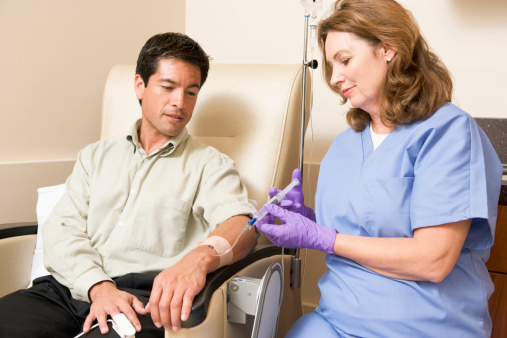

As an oncologist you will lead a healthcare team focusing on the diagnosis and treatment of cancer. Some physicians will focus on specific solid organ cancers (e.g. breast cancer) while others may focus on blood related cancers (e.g. leukemia). You will also have opportunities to practice in specialty areas such as palliative medicine, while others will be more of a generalist.
Clinical knowledge, communication and problem solving skills are minimum necessary requirements to successfully preform the duties of an Oncologist. Because oncology is stressful, knowing how you respond to and manage stress is essential. Since you will be treating severely ill patients and their families, knowing how these situations impact you is also important.
Oncology is an emerging field and you must have the academic curiosity to acquire new expertise and skills as it develops. Life long learning and application of the medical literature is essential to thrive and deliver excellent patient care.
Oncology necessitates outstanding communication skills. The ability to explain complex topics (e.g. a complication of chemotherapy or why a patient is not a candidate for treatment) in a simple, understandable way is essential. Patients value oncology physicians who listen and do not rush through an office visit.
Sharing in a family’s joy when telling someone they do not have cancer and consoling a family when a cancer has recurred will be some of the highs and lows of your practice. In addition to communicating with your patients effectively, written and verbal communication with peers in other specialties is an essential skill.
Oncologists are also part of a team. While you are the leader of your patient’s team, your patient’s care will suffer if you are not also a good team member. You will need to interact with other professional and ancillary staff to effectively deliver the best care. If you do not play well in the sandbox with others your patients will suffer.
In order to become an oncologist you must first complete the following educational prerequisites:
The median full time salary for an oncologist is $267,620 according to Salary.com. Hourly compensation is also available in some positions with a median hourly salary of $129 with a likely range of $103- $166.
Salaries will vary by various needs. In locums positions salaries also vary by how easy or difficult it is to recruit to a particular place with rural and less attractive places generally paying more. If a doctor is going to be out next week the need is higher. Additionally, cost of living and local factors play a part. In general, locums positions pay more than the equivalent full time position.
Bonuses and other incentives are often available depending on what you want to do. You may receive administrative supplements for serving as a medical director for a oncology hospital unit or hospice program.


As travel physician you can think of yourself as the ultimate ‘pinch-hitter’ providing care where it’s most needed, but on your schedule. Travel medicine offers you the opportunity to practice on your own time frame.
Oncologists are needed all over the U.S. and travel positions will offer you location independence. Often centers that are expanding services will initially look to traveling oncologists to meet their needs. Such thriving practices can be stimulating places to work and offer the opportunity to transition into full time employment
Travel can be a great way to find your ‘first’ or ‘next’ job. Short-term assignments give you the perspective and insight you will not be able to get on a 2 day interview. You will know what it is like to practice in a location and what your colleagues are like. Additionally, many companies that work with hospitals looking for temporary oncology help will take care of many of the headaches you may not want to deal with like housing, travel, malpractice insurance, and hospital privileging.
Hospitals have their own politics and you have likely seen examples of this in your own training or practice. As a traveling Oncologist, your skills are in great demand and you will not likely have to deal with such political angst.
Traveling Oncologists generally report higher salaries compared to their fulltime, location dependent colleagues.
Finally, temporary work assignments provide additional learning opportunities. You will see regional variations in Oncology practice and how similar clinical and administrative tasks are handled across different practice settings. Such experiences will enhance your skill set for administrative and other leadership positions in the future.
By Pat F. Bass III, M.D., M.S., M.P.H.
Pat Bass
Pat is a board certified General Internist and Pediatrician He has served as a reviewer for leading national publications including Pediatrics, the Journal of General Internal Medicine and the Annals of Internal Medicine. Pat is also the asthma guide to About.com, a New York Times Company. Learn more about Pat on Google+